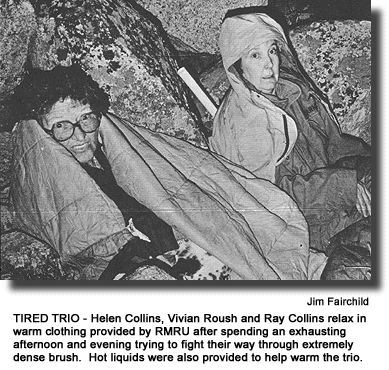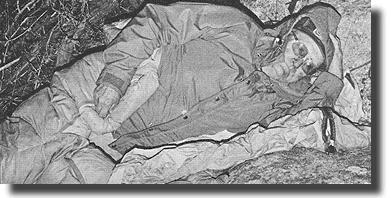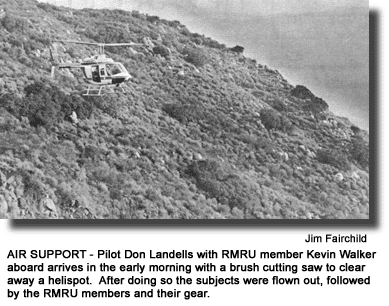Trio stopped by fatigue and darkness
|
February 7, 1984 |
 |
By Jim Fairchild
Star-gazing with daughter Carol in the Wood crest area on a hill went well. We identified the winter constellations and major stars. Her instructor of the astronomy class at Riverside College would be pleased. We started home and a mission started as the pager sounded. "…Mission in Elsinore." Before long I was driving the number two van through Temescal Canyon to ward Elsinore and beyond. Our base camp would be at the edge of the valley where dense brush covered the steep hillsides, about ten miles southeast of the city of Lake Elsinore. Kevin was already there with number one van, several California Department of Forestry (CDF) trucks were there, as well as Riverside Sheriff Office (RSO) cars and personnel. Curiously, powerful beams of lights impelled by roaring generators were trained on the hillside far away and far above. It seems that the illumination carried up to where three stranded hikers were awaiting rescue, attended by a deputy Sheriff, Jim Farley. O.K., we'll just zip right up there and escort them out.
Cameron Robbins, Craig Britton, and the writer assembled personal and unit gear for the ascent. Kevin Walker continued to gather information and advise, and would stay at base to coordinate. Unit gear consisted of the wheeled litter, ropes, rescue sleeping bag, picket stakes, and radios, plus the unit's stethoscope and sphygmomanometer. We carried light packs with extra clothing and sleeping bags, food, water, and stoves/kettles. Shucks, we'd all be back in time for breakfast in Elsinore and a bleary-eyed work day.
A deputy told us to go up a wash (creek bed) until vertically even with the stranded folks, then ascend about fifty feet. No problem. A hundred feet out we found our first problem, which way to turn. Left ended in a wall of thick chaparral, right involved hidden holes and fallen brush limbs that broke as we put weight on them, but also showed signs of recent passing. Soon we encountered a CDF crew operating another light-producing generator. We asked two of them to employ brush-hooks as brush-clearing instruments so we could have a lesser struggle hauling the litter. So it went, very slowly, lots of stumbles, scratches, and bumps. After a while Kevin radioed that Bill Blaschko, Dave Ezell, and Rob Gardner were on hand. Craig was ahead scouting the route, and Cam and the writer were muttering along with the litter. Dave and Rob would provide welcome relief. Bill, a physician, would stay at base because of a sprained ankle, and offer medical advice if needed.
The weather was balmy for February, no wind, no clouds, but thrashing along the rocky-bottomed brush-sided gully gave little opportunity for aesthetic contemplation. In fact, at one point the writer pushed on a pesky limb with such vigor that it suddenly broke and pitched him down onto a sharp rock which said "hello" to the inside of the right knee. Breath-taking pain subsided after a bit and it seemed quite appropriate that the wheeled litter was so close to effect an easy ride back to base. But no, the knee was functional, and the struggle got under way again.
When Dave and Rob reached us Cam and the writer gleefully let them take the litter and follow the hook-wielding CDF men. Not long after catching up to Craig we called above and got response from the deputy, Jim. We would now turn and ascend the sixty-degree dirt slope on our left. Well, we thought we would ascend it. We got up about thirty feet and the dirt would give way as we overpowered small rocks and bushes hold on the hillside. A callout rope was extracted from a pack as its bearer clung to grass and stood on imagination, with Craig below hanging on to a boot for psychological support. The rope having been passed up to Cam, he continued up eighty feet to tie the rope around a jammed rock. He continued on to the folks awaiting our arrival, the other two of us joining them soon. On the way we heard a woman's voice come wafting down, "Oh good!, now we can walk out."
 The three
hiker, Helen Collins, husband Ray, and Vivian
Roush, were cold, tired, and optimistic. They
thought we'd escort them down almost immediately.
We countered with descriptions of the recent
ascent route. They relented with the proviso we'd
do so when the sun came up. Not quite, the writer
had already radioed to Kevin to set in motion the
process of securing Don Landells helicopter for
airlift. It would have been foolhardy to attempt
a pedestrian evacuation because one misstep could
result in a broken limb, back injury, skull
fracture, or stick-jabbed eyeball. So there, it
would be through the air!
The three
hiker, Helen Collins, husband Ray, and Vivian
Roush, were cold, tired, and optimistic. They
thought we'd escort them down almost immediately.
We countered with descriptions of the recent
ascent route. They relented with the proviso we'd
do so when the sun came up. Not quite, the writer
had already radioed to Kevin to set in motion the
process of securing Don Landells helicopter for
airlift. It would have been foolhardy to attempt
a pedestrian evacuation because one misstep could
result in a broken limb, back injury, skull
fracture, or stick-jabbed eyeball. So there, it
would be through the air!
While the above profound determination was being expressed, warm garments and bags and insulating pads were distributed, the stove heated top ramen SOUP, and rescuers listened to rescuees describe how they got into their predicament. Rather simple, they went for their daily afternoon walk, it escalated into a promenade along a dead-end dirt road, and a several hundred foot descent through brush where they had to crawl and smash their way along. When they reached the drop-off we ascended, they turned back, only to be stopped by fatigue and darkness. They yelled for help, someone heard them after a long while. RSO deputies arrived, CDF arrived. Deputies reached the trio by a circuitous route, one stayed. RMRU was called. Hence, our involvement.
 The soup
warmed spirits and evoked compliments to Craig,
the cook. All, almost, was well, but, alas, it
was a couple of hours until dawn and Don's
expected arrival. Ah! a great time for a bivouac.
Before long the writer was defining a bivouac as
a miserable time to shiver and reflect on the
hasty discussion to bring only a pair of jackets
to loan out to the rescuees, and no insulation
from the ground and chilly air for himself. Rob
loaned a wool shirt which staved off hypothermia.
Dozing produced dreams of fireplaces, Thermarest
pads, and fiber-pile pants and jackets.
The soup
warmed spirits and evoked compliments to Craig,
the cook. All, almost, was well, but, alas, it
was a couple of hours until dawn and Don's
expected arrival. Ah! a great time for a bivouac.
Before long the writer was defining a bivouac as
a miserable time to shiver and reflect on the
hasty discussion to bring only a pair of jackets
to loan out to the rescuees, and no insulation
from the ground and chilly air for himself. Rob
loaned a wool shirt which staved off hypothermia.
Dozing produced dreams of fireplaces, Thermarest
pads, and fiber-pile pants and jackets.
The constellations of Bootes, Pegasus, and then Ursa Major began to fade a bit. Light increased in the east, and the last coyotes howled and barked nearby. The wood rats ceased their scampering past foot and head. Before long a familiar voice announced he was flying over Lake Perris and would be along shortly.
The brush surrounding our small group of boulders towered to over ten feet high in patches, and averaged six feet. Lots of it must be cleared even for a sling-type evac. Don found our base with the aid of yellow strobe lights, then circled above us. Even though we've come to expect such a request, it usually comes as a surprise when Don says, "Just clear some more brush and Ill hover right there where you are and load." O.K., but well need brush-clearing tools and Rick Pohlers still has them at home to re-sharpen after the last training. But wait, there's a small pruning saw in my pack in the van! Don soon flew over with Kevin who dropped the saw, before long rotor blade clearance was sufficient.
 It's
always a thrill to observe consummate skill in
action. The writer could do that while peering
through the brush from thirty feet away with the
radio to advise Don that his rotor blade was
about three feet away from a boulder. No problem,
real concern only begins when the blade gets less
than two feet away, right, Don? The two ladies
flew out first, then Don returned for the man and
his dog. Dog!? Yes, it was Sam, the faithful pet
and companion who at this point wished he was on
the rug safe at home. Craig finally just hoisted
him into the back seat and Ray held him. Don had
brought along a sling-board used to transport
elk, and he employed it to haul our packs out.
Next trip Rob and Cam enjoyed the one minute
flight, and Dave and the writer brought up the
rear. Compliments are due to Cam, Craig, Rob, and
Dave for enthusiastic hard work in quickly
preparing the hover spot for Don, and taking care
of loading people, dog, and packs.
It's
always a thrill to observe consummate skill in
action. The writer could do that while peering
through the brush from thirty feet away with the
radio to advise Don that his rotor blade was
about three feet away from a boulder. No problem,
real concern only begins when the blade gets less
than two feet away, right, Don? The two ladies
flew out first, then Don returned for the man and
his dog. Dog!? Yes, it was Sam, the faithful pet
and companion who at this point wished he was on
the rug safe at home. Craig finally just hoisted
him into the back seat and Ray held him. Don had
brought along a sling-board used to transport
elk, and he employed it to haul our packs out.
Next trip Rob and Cam enjoyed the one minute
flight, and Dave and the writer brought up the
rear. Compliments are due to Cam, Craig, Rob, and
Dave for enthusiastic hard work in quickly
preparing the hover spot for Don, and taking care
of loading people, dog, and packs.
Perhaps justification for all this effort comes from the quote in the Riverside Press-Enterprise newspaper from Helen Collins, "If it hadn't been for them we would have died, I'm sure," by "them" she refers to everyone who participated.